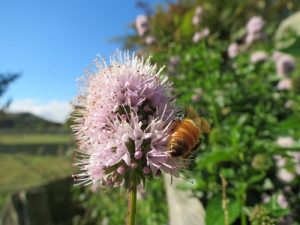Science system shakeup ‘to maximise investment value’
Reaction to the Government’s major overhaul of the country’s seven crown research organisations has so far been largely positive.
 Plant & Food Research is asking growers and beekeepers to share their current practices and their thoughts on future pollination requirements.
Plant & Food Research is asking growers and beekeepers to share their current practices and their thoughts on future pollination requirements.
Plant & Food Research is asking growers and beekeepers to share their current practices and their thoughts on future pollination requirements.
The organisation wants to better understand current use of pollination across the horticultural and agricultural sectors and help design research projects that address industry trends and needs.
"New research into pollination relies on having a full picture of how growers and beekeepers are using bees and other methods for pollinating crops, as well as what they feel are the major issues that need addressing in the future," says Dr David Pattemore.
"Current research tends to be based on overseas findings and anecdotal evidence, but there is little scientific evidence to allow scientists to develop research programmes designed to fill gaps in knowledge or directly address issues identified by growers and apiarists as fundamental to their needs."
Growers, farmers and beekeepers from across Australia and New Zealand are asked to fill in the online questionnaire at www.pollinationsurvey.com
"We know that pollination services are becoming more expensive due to the effort required to manage beehives in the wake of diseases such as varroa and colony collapse disorder, and that growers employ a variety of methods that may promote pollination by wild bees and other insects," says Dr Brad Howlett.
"By understanding what methods are currently employed in different crops and regions, we will have a better understanding of how pollination is used now, the barriers for ensuring optimal pollination, and how we can best tailor our research programme to make sure growers, and apiarists, are getting what they need to sustain their businesses."
The pollination survey is part of the European Union's SUPER-B programme and is administered, under strict confidentiality, by the University of Reading in the UK, with additional funding in New Zealand from the Ministry of Business, Innovation & Employment. SUPER-B is bringing together scientific and societal communities from more than 30 countries across Europe and the globe to develop conservation strategies for crop pollinators.
Coming in at a year-end total at 3088 units, a rise of around 10% over the 2806 total for 2024, the signs are that the New Zealand farm machinery industry is turning the corner after a difficult couple of years.
New Zealand's animal health industry has a new tool addressing a long-standing sustainability issue.
The Government has announced that ACC will be a sponsor of this year's FMG Young Farmer of the Year competition.
As veterinary student numbers grow to help address New Zealand's national workforce shortge, Massey University's School of Veterinary Science is inviting more veterinary practices to partner in training the next generation of vets.
South Island dairy farmers will soon be able to supply organic milk to Fonterra.
Norwood has announced the opening of a new Tasman dealership at Richmond near Nelson next month.